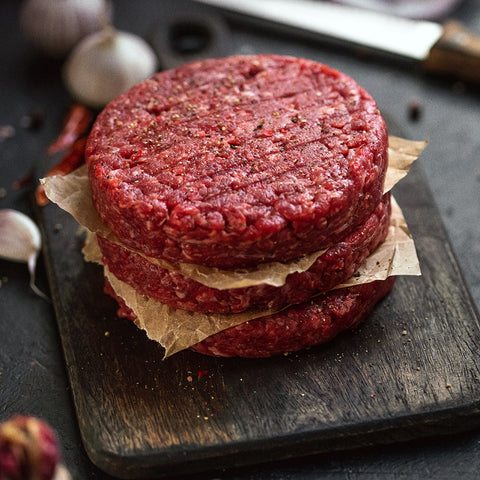What are the health benefits of eating offal? If you’re unfamiliar with the term offal, it's organ meat, and refers to animal parts that aren’t typically consumed, including liver, kidneys, heart, brain, and other muscle meats that come from cows, pigs, and poultry.
No matter how technologically advanced our society may be, our bodies are still wired to eat the same type of food they did thousands of years ago - meat. There is no need to go to great lengths to find the proof you need. Just look at how our ancient ancestors ate. Far from being rooted in superstition, the nutritional habits of ancient cultures were perfected by eons of evolution - a call and response between our bodies and the natural world.
When we examine ancient records from cultures around the world, we see that people have consistently valued organ meats above anything else. When food is scarce, these little nutritional powerhouses are handed out to tribe elders, leaders, and pregnant women. In times of plenty, the food was shared with all.
Grass-fed & Finished Beef Beef Liver Nature's Multi-vitamin
For example, one serving of grass-fed beef liver can be enough to provide a whole week's worth of Vitamin A. After perusing a rundown of the essential nutrients found in beef liver, you'll know why many compare the organ meat of ruminants to multivitamins. Now, that is nutrient-density.
Vitamin A (retinol): supports eye health and vision, bone health, endothelial cell health and white blood cell production
Riboflavin (B2): supports healthy cell growth, fat breakdown and brain function
Niacin (B3): converts nutrients to usable energy, makes fat and cholesterol, repairs DNA and contributes to over 400 chemical reactions in the body
Vitamin B6: aids in the breakdown of proteins into amino acids, carbs into glucose and fats into fatty acids and also supports a healthy immune system, brain function and a healthy level of homocysteine
Folate (B9): contributes to the formation of DNA and RNA and also metabolises protein, creates red blood cells and is instrumental in fetal development
Vitamin B12: supports healthy brain and nerve cell development and function in addition to the formation of red blood cells and DNA
Pantothenic Acid (B5): helps your body make coenzyme A, which is important in breaking down fatty acids and also building them back up
Choline: converts to acetylcholine, a neurotransmitter that's critical in muscle contractions and healthy pain response, along with proper brain function, healthy cognition and memory retention
Iron: supports hemoglobin production, which carries oxygen from the lungs all over the body and helps prevent anemia
Phosphorus: helps build strong teeth, bone, DNA and RNA
Zinc: supports a healthy immune system, protein production and cell division as well as wound healing and making your senses of taste and smell possible
Copper: contributes to red and white blood cell production, helps the body absorb iron and supports healthy brain development and immune function
Selenium: supports a healthy reproductive system, immune system and thyroid function
Grass-fed & Finished Beef Heart
Beef heart is full of tons of bioavailable nutrition and health benefits, such as CoQ10. This antioxidant provides powerful protection against oxidative stress and damage, especially in the cardiovascular and neurological systems. In addition to aiding in a healthy metabolism, it may also support in decreasing the frequency of migraine headaches.
Along with CoQ10, some other micronutrients found in beef heart are:
Riboflavin (B2)
Niacin (B3)
Vitamin B12
Iron
Phosphorus
Copper
Selenium
Start Eating Regenerative Organ Meats
There's a lot more to organ meat than most people know; they're among the most nutrient-dense foods on the planet and can easily be worked into your regular recipes. They also promote healthy keto, paleo, or carnivorous diets.
The fastest way to get started on the diet of organ meats and other offal is to grab some of REP Provision's Regenerative Raised Primal Blend Ground Beef and use it just like you would your regular ground beef (burgers, tacos, spaghetti with meatballs, etc) This way, you don't have to learn to cook anything exotic and you don't have to acquire a taste for them. In fact, your kids won't even know it is in there. The opportunities are limitless - start anywhere and explore to your heart's content!





Comments (2)
I had given up on ever getting cured of HSV2 because i have try many treatment none of them worked out for me, i have gone to different hospitals and they always tell me the same thing there is no cure for herpes. when i came across a post about Dr Osazu in the internet from a lady called Angela i contacted her and she reassured me with his herbal medicine which i took according to the way he instructed, that how i was cured. I doubted at first because i have been to a whole lot of reputable doctors, tried a lot of medicines but none was able to cure me. so i decided to listen to him and he commenced treatment, and under two weeks i was totally free from Herpes. i want to say a very big thank you to Dr Osazu for what he has done in my life. feel free to leave him a message on email osazu_spell@outlook.com
telegram -— https://t.me/solution59
MY PREGNANCY TESTIMONY
Hello everyone my names is Great. I want to testify of a powerful man called Priest Odaro and how he helped me get pregnant, I and my husband have been married for 10 years now without a child to call our own I have done everything I can but still couldn’t get pregnant this was eating me up inside i was always ashamed whenever i and my husband go out because i see him playing with other children because he love kids so much one day when we got home i was crying bitterly i just couldn’t bear it anymore i went online to look for fertility treatment when i saw someone testify of his great work and how he have help many in problems with his spell i decided to give him a try i contacted him through his email he assure me that it will take 24 hrs to cast the spell and i will be pregnant, 5 weeks after i felt ill so i went to see the doctor he confirmed that i was pregnant all thanks to this powerful spell caster Priest Odaro you are indeed a great man now i believe that there is no problem without a solution he can also help you contact
VIA/Email:priestodaro@gmail.com
WHATSAPP:+2347071495718